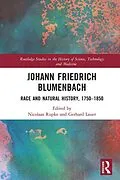The major significance of the German naturalist-physician Johann Friedrich Blumenbach (1752-1840) as a topic of historical study is the fact that he was one of the first anthropologists to investigate humankind as part of natural history. Moreover, Blumenbach was, and continues to be, a central figure in debates about race and racism.
How exactly did Blumenbach define race and races? What were his scientific criteria? And which cultural values did he bring to bear on his scheme? Little historical work has been done on Blumenbach's fundamental, influential race work. From his own time till today, several different pronouncements have been made by either followers or opponents, some accusing Blumenbach of being the fountainhead of scientific racism. By contrast, across early nineteenth-century Europe, not least in France, Blumenbach was lionized as an anti-racist whose work supported the unity of humankind and the abolition of slavery.
This collection of essays considers how, with Blumenbach and those around him, the study of natural history and, by extension, that of science came to dominate the Western discourse of race.
Autorentext
Nicolaas Rupke is Professor Emeritus of the History of Science at the University of Göttingen, Germany, and Rupert H. Johnson Jr. Professor at Washington and Lee University, USA.
Gerhard Lauer is Professor of Digital Humanities at the University of Basel, Switzerland, and the current director of the Blumenbach - Online project.
Inhalt
Contents
List of figures and tables
Notes on Contributors
Preface
Acknowledgements
Blumenbach studies
1. Introduction: brief history of Blumenbach representation
Nicolaas Rupke and Gerhard Lauer
2. Johann Friedrich Blumenbach-online
Gerhard Lauer and Heiko Weber
Defining human races
3. Buffon, Blumenbach, Herder, Lichtenberg and the origins of modern anthropology
Carl Niekerk
4. Climate change and creolization in French natural history, 1750-1795
E.C. Spary
5. Blumenbach's collection of human skulls
Wolfgang Böker
6. Blumenbach's theory of human races and the natural unity of humankind
Thomas Junker
7. A defence of human rights: Blumenbach on albinism
Renato G. Mazzolini
Racism, anti-racism and Eurocentricity
8. Blumenbach's race science in the light of Christian supersessionism
Terence Keel
9. The beautiful skulls of Schiller and the Georgian girl: quantitative and aesthetic scaling of the races, 1750-1850
Robert J. Richards
10. Ethnographic exploration in the Blumenbachian tradition
Peter Hanns Reill
11. The rise of paleontology and the historicization of nature: Blumenbach and Deluc
John H. Zammito
12. The roots of scientific racism and Huxley's Rule
Nicolaas Rupke
Appendix: Biographical sketch of Blumenbach
Index
